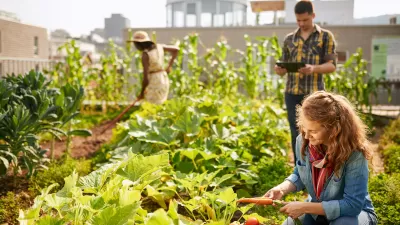Food is a central part of New York City's economy. Residents of the city spend $30 billion on food each year: growing jobs, driving development, and defining its neighborhoods. Yet there's much more NY could do to support its food resurgence.
"Food is to cities what tech was in the 90s: a large, disparate, confusing universe of entrepreneurs and creative types ranging from the tiny DIY young manufacturers at Brooklyn's Smorgasburg to Manhattan's renowned high-end restaurants," says Julia Vitullo-Martin, Senior Fellow with the Regional Plan Association. "But like the tech sector, restaurants, markets and food products have often ended up defining neighborhoods and sustaining them."
"But despite the importance of food employment (40% of New York's new jobs in the last two years have been in food) and the $30 billion spent annually on food by New Yorkers, New York has been late in officially recognizing food's importance, as London's Mayor Boris Johnson pointed out to Mayor Bloomberg in 2009."
"If New York and the region's food resurgence is to continue, both from a culinary and an industrial point of view, the city, state and region should replicate their food-oriented brethren elsewhere and adapt a number of useful plans."
Vitullo-Martin offers several suggestions, including establishing a central agency for food plans and policies and building a wholesale distribution market for regional food, to help fill the gaps in the area's food system infrastructure.
FULL STORY: Eat Up: Food Policy in a Food City

Planetizen Federal Action Tracker
A weekly monitor of how Trump’s orders and actions are impacting planners and planning in America.

Maui's Vacation Rental Debate Turns Ugly
Verbal attacks, misinformation campaigns and fistfights plague a high-stakes debate to convert thousands of vacation rentals into long-term housing.

San Francisco Suspends Traffic Calming Amidst Record Deaths
Citing “a challenging fiscal landscape,” the city will cease the program on the heels of 42 traffic deaths, including 24 pedestrians.

Defunct Pittsburgh Power Plant to Become Residential Tower
A decommissioned steam heat plant will be redeveloped into almost 100 affordable housing units.

Trump Prompts Restructuring of Transportation Research Board in “Unprecedented Overreach”
The TRB has eliminated more than half of its committees including those focused on climate, equity, and cities.

Amtrak Rolls Out New Orleans to Alabama “Mardi Gras” Train
The new service will operate morning and evening departures between Mobile and New Orleans.
Urban Design for Planners 1: Software Tools
This six-course series explores essential urban design concepts using open source software and equips planners with the tools they need to participate fully in the urban design process.
Planning for Universal Design
Learn the tools for implementing Universal Design in planning regulations.
Heyer Gruel & Associates PA
JM Goldson LLC
Custer County Colorado
City of Camden Redevelopment Agency
City of Astoria
Transportation Research & Education Center (TREC) at Portland State University
Jefferson Parish Government
Camden Redevelopment Agency
City of Claremont




























